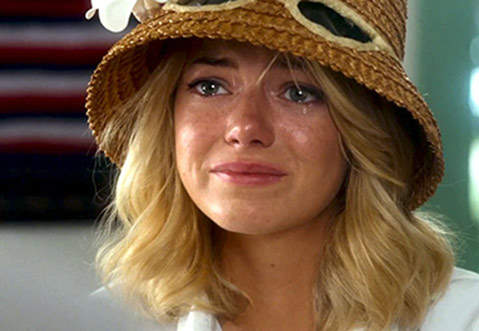Say Goodbye to Aloha
Cameron Crowe’s Latest Should Be Tossed into a Hawaiian Volcano.

In Aloha, originally called Deep Tiki, a few white romances unfold on the island of Hawai‘i against an exoticized backdrop of natives, with their quaint superstitions. Bradley Cooper plays Brian Gilcrest, an emotionally constipated man fresh from a war who comes to the islands with dark secrets — children from a past marriage; the keys to a potentially mass-destructive satellite weapons operation; and, worst of all, a cynical streak, a real turnoff. He meets the starkly white quarter-Hawaiian native, Allison Ng, played by someone with no affiliation to Hawai‘i, Emma Stone, who previously played a journalistic white savior in The Help. Rachel McAdams is Tracy Woodside, a pleasantly smiling housewife, alluring and tempting to the pillaging military man Gilcrest, except she’s tethered to a silent husband. No one is likable.
Through magical wind and thunder, the Hawaiian gods guide these love-fools from one peppy interaction to the next, directing their fates like Greek gods, though why the spirits of the island would care to intervene is a good question. Perhaps someone could ask the movie’s 11- or 12-year-old Hawaiian mythology expert named Mitchell, played by Jaeden Lieberher, who upholds the tradition of wise children characters: cute and mystifying in real life, annoying on-screen. Or Ng, who reveres the sky for all its special wonder, which she and Gilcrest can coo over. They fall so dopily in love that Gilcrest blows up a satellite to win her favor.
How does he do it? This being a Cameron Crowe film, he does it with rock music. Crowe loves to make movies where the wicked crumble against the power of rock, romance, and pretty, pants-less ladies. The image of a potentially weaponized satellite combusting because of overexposure to the sounds and images of David Bowie and Elvis Presley is a gigantic self-aggrandizement reminiscent of the beginning of 2001: A Space Odyssey, where Stanley Kubrick audaciously blasts his name across the birth of the universe. Crowe would do well to humble himself, toss the remaining copies of this $37 million film into a Hawaiian volcano, and begin to atone.



